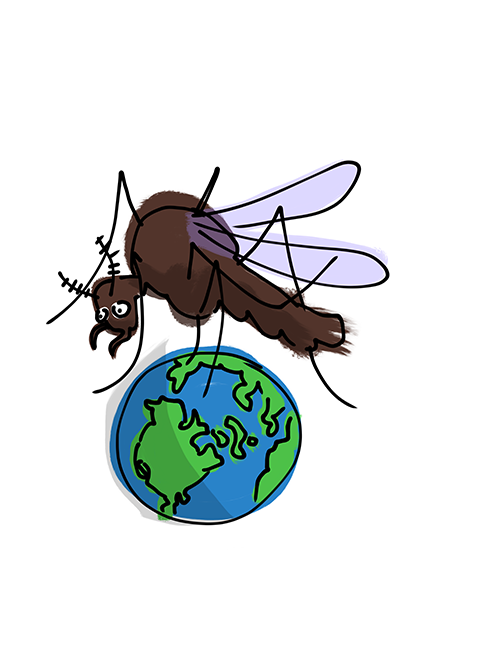The Zika virus, once little known and of little interest to the Florida resident, has recently become a cause of major concern. At presstime, 37 Floridians have been diagnosed with Zika, including three in Orange County. Fortunately, the people infected so far were all out of state when they received the virus. Governor Rick Scott recently declared a state of emergency in the counties where the infected are located, allowing the Department of Health to take more extreme measures in preventing the spread of infection. More mosquito spray is authorized to try to hold back the mosquito population in places such as Osceola and Broward counties.
The current Zika pandemic originated in northern and eastern Brazil. According to The New York Times, research has indicated that it may have spread to Brazil from Polynesia during the 2014 FIFA World Cup. As of today, the virus has infected an estimated 1.5 million Brazilians.
Its main carrier is the Aedes aegypti mosquito, also infamously known as the yellow fever mosquito. The mosquito can be found nearly everywhere around the equator, ranging from Mexico to Australia. The yellow fever mosquito is also responsible for the spread of dengue fever and chikungunya virus. In addition, another species known as the tiger mosquito is known to be capable of carrying Zika. Both flourish in the lake-ridden flatlands of Central Florida, where almost any still body of water can host hundreds, if not thousands, of mosquito larvae.
According to the Center for Disease Control, the Zika virus can be spread in many ways, but most of the time an infected carrier mosquito will infect a human by biting. If an uninfected mosquito bites the infected human, it will be capable of further spreading the disease. In addition, the CDC has found evidence of Zika being transmitted through urine, blood, saliva and sexual contact, making it especially potent for densely populated areas. Senior Julia Paoli, who runs a virology blog in conjunction with Scitable and the Nature Publishing Group, noted:
“Because testes are immune privileged [able to better tolerate an immune attack], Zika virus stays longer in semen than in blood,” Paoli said. “[This] means that men could possibly transmit the virus even after having cleared it from their bloodstream.”
Normally, Zika itself has few major effects. Only 20% of those infected will actually become ill from the virus, and the most common side effects are rashes, muscle pain and conjunctivitis. Symptoms last for a maximum of one week, and the virus usually stays in the blood for about the same amount of time.
The big issue occurs when Zika infects pregnant women. Studies have found that the Zika virus likely causes infant microcephaly, which causes a newborn’s head to be abnormally small. The CDC states that microcephaly can cause seizures or developmental delays and is linked to multiple other birth defects.
“Zika virus RNA has been identified in the amniotic fluid of women whose fetuses were born with microcephaly,” biology teacher Paula Phillips said. “Viruses of this nature generally attack stem cells during early brain development.”
According to pediatric cardiologist Dr Sandra Mattos’s four-year study, microcephaly has been found in 2-8% of recent births in Brazil.. Although microcephaly has been abnormally present in Brazil for years, the Zika virus may have been its cause all along.
In an effort to prevent the spread of Zika among pregnant women, the CDC issued an Alert Level 2, which advises that those at risk of infection “practice advanced precautions when traveling to affected countries.” Countries currently on the high-risk list include Mexico, Cape Verde, Samoa and most of South America and the Caribbean island nations. Even with the warning, nine pregnant American women tested positive for Zika. So far, only one baby has been born with microcephaly, but two others had miscarriages.
“Since recent evidence suggests a possible association between infection in pregnant women and congenital microcephaly, as well as other adverse fetal outcomes, women who are pregnant should be much more wary than others,” Philips said.
President Barack Obama announced on Feb. 8 that he included a request for $1.8 billion in emergency funding from Congress to combat the virus. The money would go towards controlling local mosquito populations and research for possible vaccines, which at the present time have not been found. Financial aid estimated at $355 million would go to the Caribbean, South America and Central America to benefit areas most seriously affected.
One of the main issues with the Zika virus is the fact that so little research has been done on the disease. In fact, the World Health Organization (WHO) states that the first major spread of Zika was not until 2007, and only 31 people in Micronesia were infected.
“What most concerns me is how little scientists know about Zika,” Paoli said. “Prior to the outbreak, Zika was considered a mild virus so little research or money was devoted to its study. It will be years before a vaccine proven to be safe and effective against Zika is available to the public.”
Perhaps the biggest concern is the Olympics taking place in Zika-ridden Brazil this summer. Although the U.S. Olympic Committee has stated that Zika would not affect U.S. teams’ attendance, soccer star Hope Solo stated that she would skip the games if they were held.
“Since the virus produces only mild symptoms in adults—as far as we know—there is minimal concern for athletes or spectators,” Paoli said. “However, it has been recommended that pregnant women refrain from going, and those who plan on becoming pregnant soon may want to cancel their Olympic plans.”
On a positive note, Paoli added that since Brazil lies below the equator, it would be winter by the time athletes arrive. Colder weather generally drives mosquitos away, decreasing the chances of a larger outbreak.
Until a cure can be found, vulnerable areas like Florida will continue to hold their breaths in the coming months.















